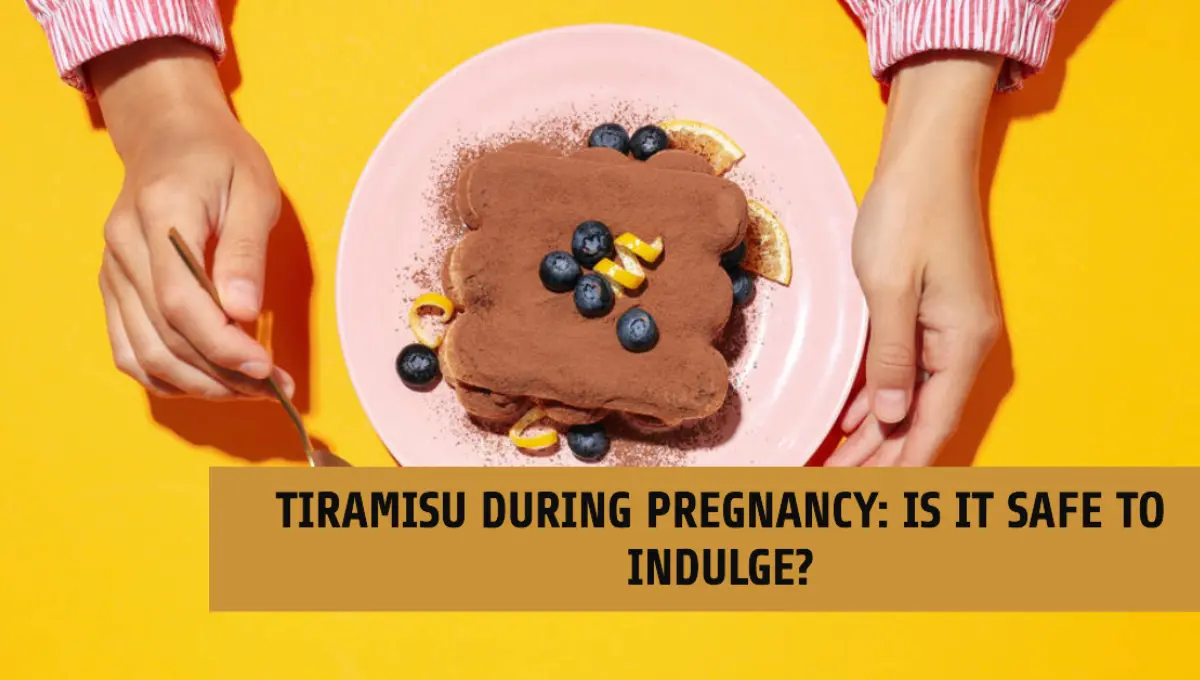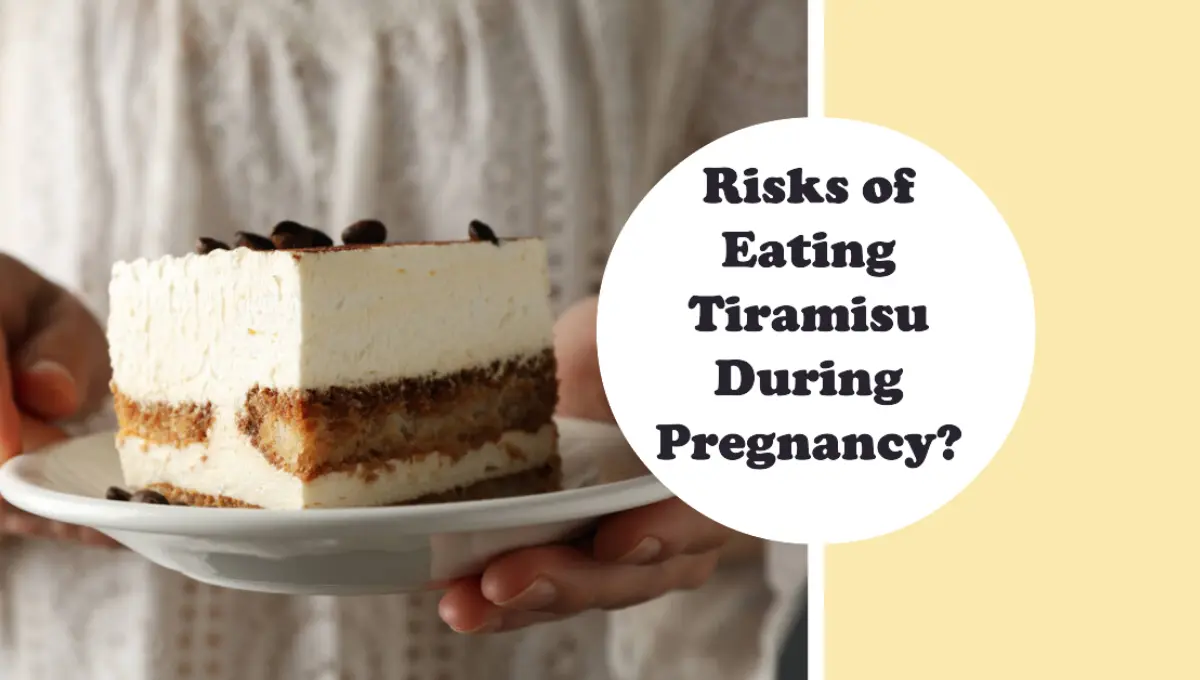
Tiramisu is a popular Italian dessert that contains coffee, mascarpone cheese, ladyfingers, and cocoa powder. It is a rich and decadent treat that many pregnant women crave. However, there are concerns about the safety of eating tiramisu during pregnancy due to the presence of raw eggs, caffeine, and alcohol. In this article on PregnancyBoss, we will explore whether it is safe to eat tiramisu during pregnancy and provide tips on how to make it safe.
What is Tiramisu and What ingredients are in it?

Tiramisu is a dessert that originated in Italy. It typically consists of ladyfingers dipped in coffee and layered with a mixture of mascarpone cheese, eggs, sugar, and cocoa powder. Some recipes also include alcohol, such as Marsala wine or brandy.
Can you safely eat Tiramisu during Pregnancy?

No, it is not safe to eat tiramisu during pregnancy. The main concerns with tiramisu are the presence of raw eggs, caffeine, and alcohol. Raw eggs can contain salmonella, which can cause food poisoning. Pregnant women are at a higher risk of developing food poisoning, which can lead to serious complications for both the mother and the baby. Caffeine, on the other hand, has been linked to an increased risk of miscarriage and other complications in pregnancy. Alcohol is also a concern, as it can cause fetal alcohol syndrome, which can lead to developmental problems in the baby.
What are the risks of eating Tiramisu during Pregnancy?

While the ingredients in tiramisu are generally safe to consume during pregnancy, there are a few potential concerns. Here are some of the risks of eating tiramisu during pregnancy:
- Raw Eggs: Tiramisu often contains raw eggs, which may contain bacteria that can cause food poisoning or other infections.
- Caffeine: Tiramisu contains coffee, which is a source of caffeine. High levels of caffeine can lead to miscarriage and other complications in pregnancy.
- Alcohol: Some recipes for tiramisu contain alcohol, which can cause fetal alcohol syndrome and lead to developmental problems in the baby.
- Sugar: Tiramisu is high in sugar, which can lead to weight gain, gestational diabetes, and high blood pressure.
When is Tiramisu safe to eat during Pregnancy?

While tiramisu is generally not safe to eat during pregnancy, there are some scenarios where it is safe. Here are some tips on how to make tiramisu safe to eat during pregnancy:
- Use Pasteurized Eggs: Use pasteurized eggs to ensure that the tiramisu is safe to eat. Pasteurization kills any bacteria that may be present in the eggs.
- Limit Caffeine Intake: Limit your caffeine intake to 200 milligrams per day. This is equivalent to one cup of coffee.
- Avoid Alcohol: Avoid tiramisu recipes that contain alcohol. Instead, use non-alcoholic substitutes like fruit juice or flavored syrups.
- Limit Sugar Intake: Limit your sugar intake by using natural sweeteners like honey or maple syrup instead of refined sugar.
How to make safe Tiramisu during Pregnancy?
Here is a recipe for safe tiramisu during pregnancy:
Ingredients:
- 6 egg yolks, pasteurized
- 3/4 cup granulated sugar
- 2/3 cup milk
- 1 1/4 cups mascarpone cheese
- 1 3/4 cups heavy cream
- 1/2 cup brewed coffee, cooled
- 24 ladyfingers
- Cocoa powder, for dusting
Instructions:
- In a large bowl, whisk together the egg yolks and sugar until pale and thick.
- In a small saucepan, heat the milk until it just begins to boil. Gradually pour the hot milk into the egg mixture, whisking constantly.
- Pour the mixture back into the saucepan and cook over low heat, stirring constantly, until it thickens and coats the back of a spoon.
- Remove from heat and stir in the mascarpone cheese until smooth.
- In a separate bowl, whip the heavy cream until stiff peaks form.
- Fold the whipped cream into the mascarpone mixture until well combined.
- Dip the ladyfingers into the cooled coffee and arrange them in a single layer in the bottom of a 9×13 inch dish.
- Spread half of the mascarpone mixture over the ladyfingers.
- Repeat with another layer of ladyfingers and mascarpone mixture.
- Cover and refrigerate for at least 2 hours, or overnight.
- Dust with cocoa powder before serving.
Conclusion
In conclusion, tiramisu is generally not safe to eat during pregnancy due to the presence of raw eggs, caffeine, and alcohol. However, there are ways to make it safe by using pasteurized eggs, limiting caffeine intake, avoiding alcohol, and limiting sugar intake. As with any food during pregnancy, it is important to be mindful of what you eat and to consult with your healthcare provider if you have any concerns.
Frequently Asked Questions (FAQs)
Can I eat tiramisu during pregnancy?
While it is generally not recommended to eat tiramisu during pregnancy due to the presence of raw eggs, caffeine, and alcohol, there are ways to make it safe. Using pasteurized eggs, limiting caffeine intake, avoiding alcohol, and limiting sugar intake can make tiramisu safe to eat during pregnancy.
Why is tiramisu unsafe during pregnancy?
Tiramisu is unsafe during pregnancy due to the presence of raw eggs, which can contain salmonella and cause food poisoning. Caffeine, which is found in coffee, can lead to miscarriage and other complications in pregnancy. Alcohol, which is sometimes used in tiramisu recipes, can cause fetal alcohol syndrome and lead to developmental problems in the baby.
Can I eat tiramisu if it doesn’t contain raw eggs or alcohol?
If tiramisu is made without raw eggs or alcohol, it may be safe to eat during pregnancy. However, it is still important to limit caffeine intake and sugar intake.
Can I eat store-bought tiramisu during pregnancy?
Store-bought tiramisu may contain raw eggs, caffeine, and alcohol, so it is generally not recommended to eat it during pregnancy. However, if you are unsure about the ingredients, you can check the label or ask the manufacturer.
What are some safe alternatives to tiramisu during pregnancy?
Some safe alternatives to tiramisu during pregnancy include fruit salad, yogurt parfait, and angel food cake with fresh berries. These desserts are low in caffeine, sugar, and alcohol, and are generally safe to eat during pregnancy.












